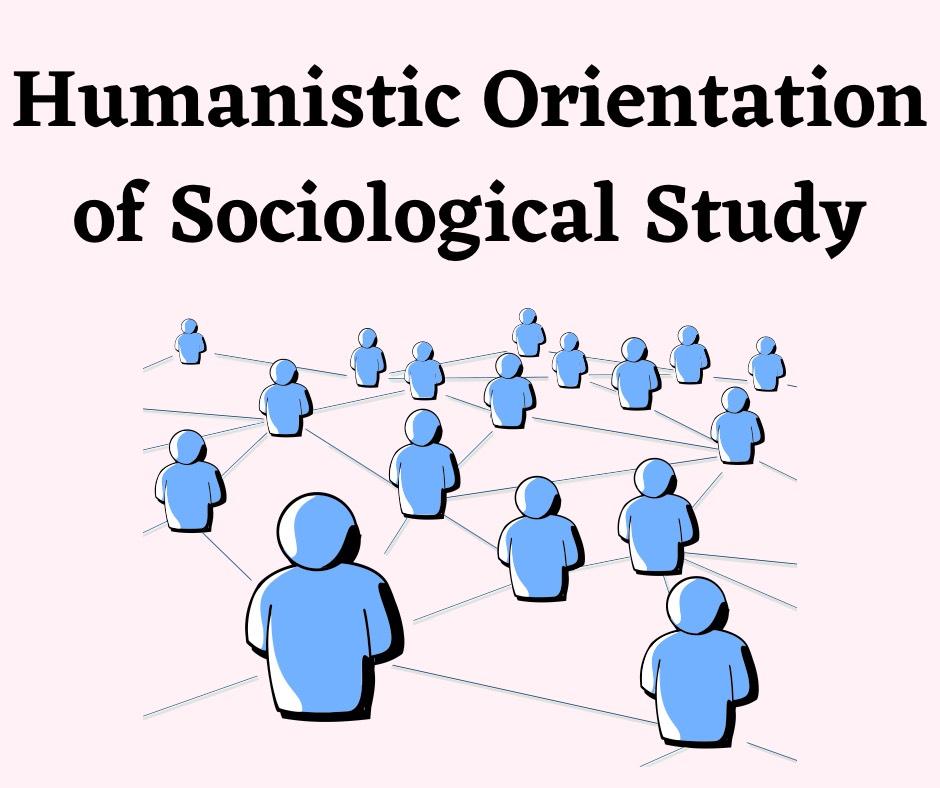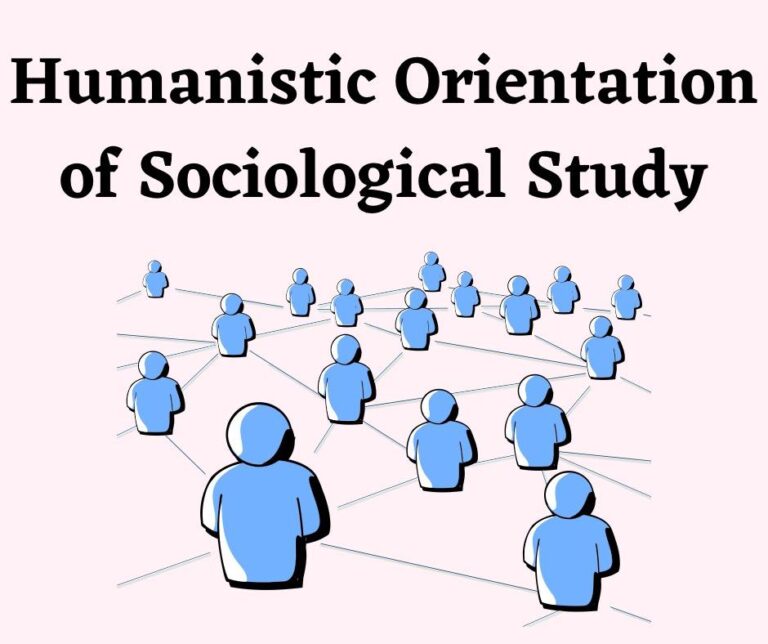BA 1st Year Humanistic Orientation of Sociological Study Notes Material in English


BA 1st Year Humanistic Orientation of Sociological Study Notes Material in English: Humanism in its broadest sense can be traced to the philosophic, movement that originated in Italy in the second half of the fourteenth century and that affirmed the dignity of the human being. Although over the centuries there have been numerous varieties of humanism, both religious ad, non-religious, all have been in agreement on the basic tenet that every human being has dignity and worth and therefore should be the measure of all things.
Humanism, as practised in sociology starts from two fundamental assumptions. The first of these is that sociology should be a moral enterprise, one whose fundamental purpose is to challenge the views and conditions that restrain human potential in a given society. The second is that sociology should not be defined as a scientific discipline that embraces ‘positivism‘ the position that facts, exists independently of the observer and that the observer should be a value-neutral compiler of facts.
Sociologists Operating in the Humanist Tradition
Sociologists operating in the humanist tradition hold that the study of society begins with the premise that human beings are free to create their social world and that whatever impinges on that freedom is ultimately negative and destructive. They argue that the use of one of the traditional methodological tools of science has not only taken sociology away from its Enlightenment origins in moral philosophy but is based on a faulty epistemology.
Although diverse theoretical frameworks, such as Marxism, conflict theory, phenomenology, symbolic interaction, and feminist sociology, can all be said to have some form of a humanistic orientation as a part of their overall frameworks, humanism in sociology is most readily identified with those sociologists who. in their teaching, research, and activism gravitate around the Association for Humanist Sociology (AHS), which was founded in 1976 by Alfred McClung Lee, Elizabeth McClung Lee and Charles Flynn.
The foundations of humanism in sociology
The fundamental underpinnings of sociological humanism can be traced back to two traditions that came out of the Enlightenment; normal philosophy and empiricism. Although Modern sociologists see these traditions as separate, from the Enlightenment French and Scottish philosophers (collectively known as the philosophers) they were intertwined and interdependent. The philosophers called for a fusion of morals and science, for a social science that sought to liberate the human spirit and ensure the fullest development of the person. It is the phase of moral philosophy J empiricism as modified by German idealism and, more recently by the American philosophical tradition of pragmatism, mat constitutes the foundations of humanism in sociology, today.
The Enlightenment and the Legacy of Sociological Human
Although the Enlightenment philosophers initiated the enterprise of modern society through their calf for the application of scientific principles to the study of human behaviour (Rossides 1998), humanist, sociologists stress that the philosophers were first and foremost moral philosophers. Science and morality were to be fused, not separated; the ‘is’ and thought’ were to be merged into a moral science, a science for the betterment of humankind. It was Jean Jacques Rousseau, with his arguments against inequality and for the dignity of the person who best represents this tradition of moral science tradition. Rousseau (28 June 1712-2 July 1778) started with the fundamental assumption that all people are created equal and from this formulated a radical system of politics.
Individual Liberty and Freedom
Rousseau and the philosophers were wedded to the idea that individual liberty and freedom prospered only under conditions of minimal external constraint that had to. be consensually based. In the eighteenth century, the philosophers articulated their doctrine of individual liberty and freedom chiefly in the idiom of natural rights (Seidman 1983).
The philosophers held that the most important value was the freedom of the individual in a human society that ensured this freedom. Not having any development psychology of the individual, of the subjective side of human behaviour, or of how institutions are formed, they could not go beyond this modest beginning. They could not fashion a full-blown vision of the free individual within a society based on the principle of human freedom.
The tradition of moral science is overlooked by contemporary sociologists
This tradition of moral science is overlooked by contemporary sociologists, who instead focus on the empiricism of the philosophers; but although empiricism, without doubt, played the greatest role in the rise of social science, it is only one part of what the philosophers advocated. in their dismissal of the moral science tradition and their virtually unquestioning embrace of the positivism of Comte, Spenser, Durkheim, and the other early founders of sociology as a discipline, contemporary sociologists overlook the philosopher’s concern that there was an epistemological dilemma inherent in the new empirical science they envisioned.
Rejection of Greek and Medieval Christian Epistemology
If a social science was to arise out of the Enlightenment, it had to have a new conception of knowledge, one that rejected Greek and medieval Christian epistemology. The Aristotelian view held that a definite entity resided within the human body, an entity that passively observed what was going on in the world, and it is this passive observation that constitutes experience. Science, in the Aristotelian model, was the process of observing objects as they were thought to be conceived in the human mind Following.
Newton, the world was to be understood in terms of mathematical equations using axioms that were put in the minds of humans by God and that enabled the mind to picture a reality. “John Lock’s Essay Concerning Human Understanding represented an early attempt to show that the extreme rationalist notion that the world precisely followed mathematical axioms was in error, Locke argued that first principles did not exist a priori but came from the facts of experience.
Conclusion of David Hume
Locke argued that first principles did not exist a priori but came from the facts of experience. Locke, however, became caught up in the epistemological dilemma that experience was mental, and not physical, and therefore still had to be located in the ‘unscientific concept of mind. This led Locke, like. David Hume (1711-1776), concluded that an exact science of human behaviour was unattainable (Randall 1976). Only probabilistic knowledge could be arrived at and this could only modestly be used to guide humankind.
Although the epistemological dilemma posed by Locke and other Enlightenment thinkers was real to them, the development of sociology in France, England, and later in the United States discarded these concerns and embraced positivism as the cornerstone of the discipline. Sociology, however, developed differently in Germany, and it is through German social science that the tradition of humanism in sociology was kept alive.
Humanist Sociology Today
Sociology (Humanist Sociology) has moved beyond pragmatism via its attempt to spell out the social structural conditions for the maximization of freedom. Humanist sociology is based on moral precepts, the foremost of which is that of freedom “the maximization of alternatives” (Scimecca 1955, ).
This is assumed to be the most desirable state for human beings and the goal of sociology is to work toward the realization of conditions that insure this freedom. Given its Median theory of self (an active theory of self that chooses between alternatives). Humanist sociology begins with the fundamental assumption that all varieties of humanism hold that individuals are the measure of all things. Using a non-positivistic epistemological foundation, humanist sociologists employ their methods of research to answer the most important question that can be asked by a humanist sociologist about human behaviour, the one originally raised by Enlightenment philosophers. How can social science help to fashion a human society in which freedom can best be realized?
Relationship of Sociology with Other Social Science




2 Comments
Pingback: Distinguish Between Society' and 'A Society' BA 1st Year Notes Study Material in English
Pingback: BA 1st Year Importance of Sociology Notes Study Material In English - myknowledgepower.com